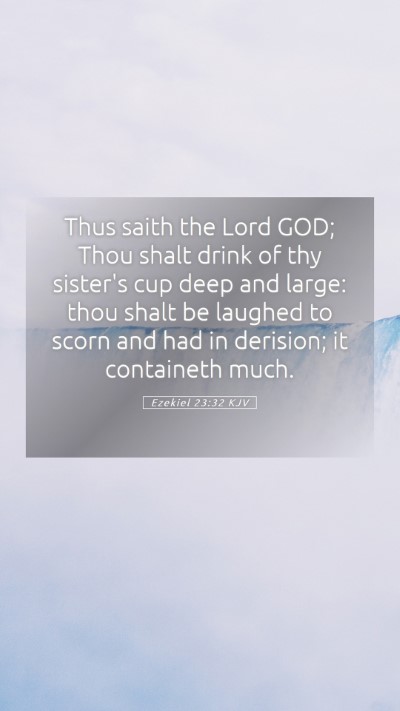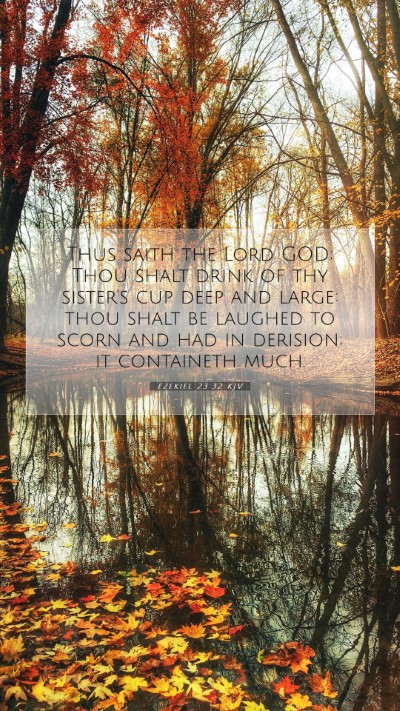Ezekiel 23:32 - Understanding the Meaning
The verse Ezekiel 23:32 is a part of a complex narrative in the book of Ezekiel that deals with the judgment of Jerusalem and Samaria. The imagery used in this verse reflects deep spiritual themes that require careful interpretation and understanding within the broader context of Scripture.
This passage serves as a metaphorical depiction of Israel's infidelity to God, often likened to the actions of unfaithful women, which is a recurring theme in the prophetic literature.
Verse Context
Ezekiel 23 presents a vivid allegory of two sisters, Oholah and Oholibah, representing Samaria and Jerusalem respectively. The chapter discusses their harlotries and the consequences of their spiritual unfaithfulness. This verse emphasizes the seriousness of their idolatry and the resulting divine judgment.
Commentary Insights
-
Matthew Henry:
Matthew Henry's commentary indicates that Ezekiel is illustrating the corrupt and wayward nature of Israel through the personas of these sisters. Their actions symbolize the collective unfaithfulness of the people towards God. This serves as a dire warning of the consequences that stem from straying away from divine commandments.
-
Albert Barnes:
Albert Barnes offers an interpretation that highlights the severity of God's judgment upon Israel. He notes how the metaphor of a harlot signifies the betrayal of the covenant relationship between God and His people. The pursuit of foreign alliances and idol worship led to a profound spiritual downfall, articulating God's displeasure and the impending judgment.
-
Adam Clarke:
Adam Clarke emphasizes the historical context behind the allegory. He relates the actions of the sisters to Israel's troubled history, including periods of rebellion against God. Clarke reminds readers that this passage is not just a condemnation but also acts as a call for repentance and a return to faithfulness.
Theological Implications
The theological implications of Ezekiel 23:32 extend far beyond its immediate literary form. It serves as a critical reflection on the nature of sin, the consequences of turning from God, and the visceral need for faithfulness in the believer’s relationship with the Creator. It underscores the idea that idolatry and spiritual infidelity not only lead to national judgment but also personal despair.
Application for Today
For contemporary readers, Ezekiel 23:32 holds significant relevance. This verse encourages individuals and communities to recognize the dangers of turning away from God’s teachings. In applying the lessons from this scripture, believers are urged to maintain their covenant with God and avoid the distractions that lead to spiritual infidelity.
Bible Study Insights
When pursuing a deeper understanding of this verse, it can be beneficial to engage in Bible study groups or online Bible studies. Utilizing Bible study tools and various Bible study resources can also enhance one's comprehension of these significant themes.
Cross References
- Jeremiah 2:20 - Discusses the unfaithfulness of Israel.
- Hosea 4:12 - Describes the spiritual adultery of the people.
- Isaiah 54:5 - Refers to God as a husband to His people, highlighting the themes of fidelity.
- Revelation 17:1-5 - Explores the imagery of the harlot in relation to the end times, showing the continuity of this theme through scripture.
Resources for Further Study
- Bible Study Guides: To help break down the complexities of prophetic literature.
- Bible Study Lessons: Focused on understanding Old Testament themes.
- Bible Study Courses: Online courses that delve into the historical and cultural contexts of the Scriptures.
Conclusion
Ezekiel 23:32 serves as a potent reminder of the importance of faithfulness to God. The vivid imagery and the solemn warnings encapsulated within this verse invite readers into a profound journey of personal reflection and communal accountability in their spiritual walk. It challenges all believers to examine their lives and ensure their allegiance to the divine covenant.


